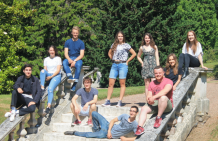Articles

Mine waste water project seeks gold in International Genetically Engineered Machine Competition (iGEM)
Mine waste water project seeks gold in International Genetically Engineered Machine Competition (iGEM)
This November, a team of undergraduate students from the University of Exeter will travel to the USA in their campaign to take home a fourth gold medal in the International Genetically Engineered Machine competition (iGEM).
The competition sees interdisciplinary teams from Universities across the world work on projects to build genetically engineered systems using standard biological parts called BioBricks, to solve real-world challenges. The Exeter team will present the results of their project to the iGEM community at the Giant Jamboree event in Boston, USA.
The 2017 team aims to make a toolkit for pili modification, in order to clean up mine waste water in Cornwall. Heavy metal ion pollutants have significant effects on local flora and fauna and their leaching has implications for human health. Current treatment methods are energetically costly and, in the case of lime dosing, environmentally detrimental. The Exeter team will develop a toolkit to clean up mine waste water, which will have significant applications and impact in the real world.
iGEM is more than just lab work, with teams being required to consider and address the safety, security, human and environmental implications of their work. They are also required to produce a Wiki documenting their project, and a poster and presentation of their key findings. The competition allows students to develop a wide variety of skills in scientific communication, fundraising, networking, collaboration, project management and presentation skills to name a few.
The University of Exeter has a strong success rate in the competition, having entered the iGEM competition for the last five years and won one Bronze medal (2012), one Silver medal (2013) and three Gold medals (2014, 2015 and 2016). Two of the projects produced by University of Exeter undergraduates have been hugely successful, having been developed into funded projects in the lab.
The 2014 project, entitled Erase, was designed to address the problem of toxic levels of the explosive, TNT and related compounds still found in former war zones and at TNT production sites. The 2015 team looked at the local problem of TB infection in cattle, aiming to create a test for TB which would differentiate between infected and vaccinated animals - this project is now fully funded for three years in Biosciences. In 2016, the team developed some innovative outreach material, producing a board game with which to teach school children (and their teachers) about Synthetic Biology and releasing a podcast series, Desert Island… Science?, where local and international scientists such as Professor Jim Al-Khalil OBE, a leading British scientist, author and broadcaster, were interviewed about their interests in science and music. Funding has been secured from the Biochemical Society to allow one of the students to continue working on this project.
See how our team gets on this year by following Exeter iGem 2017 on Twitter. Read more about the iGem competition by visiting their website.
Date: 15 September 2017
